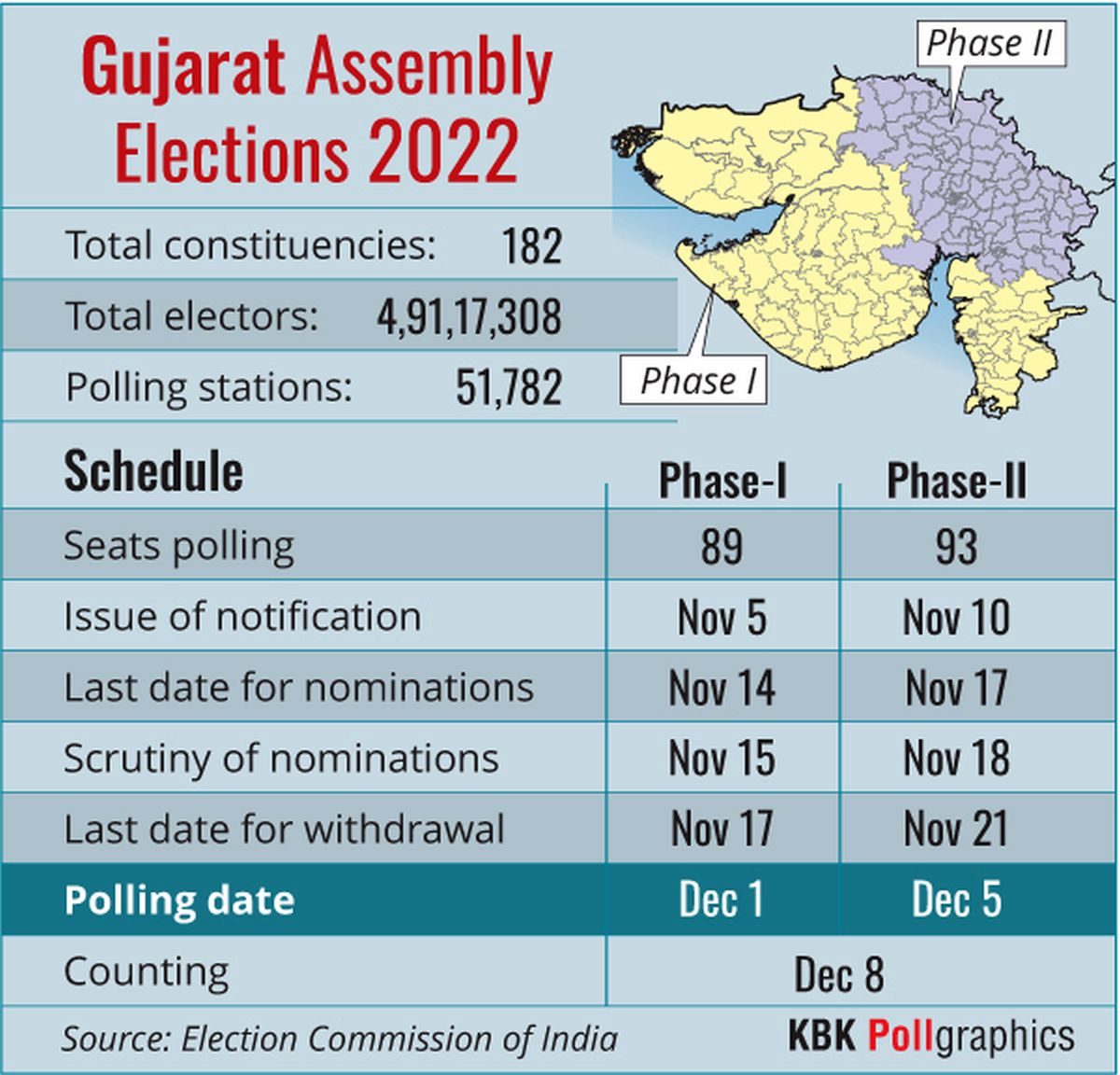Gujarat will go to the assembly polls in two phases on December 1 and 5 in an election spiced up by the Aam Aadmi Party's entry as the Bharatiya Janata Party looks to continue its uninterrupted winning streak there since 1995 while the main opposition Congress works to amp up its campaign.

Chief Election Commissioner Rajiv Kumar announced the poll schedule in New Delhi on Thursday, with the counting of votes fixed for December 8 along with that in Himachal Pradesh where the single-phase election will be held on November 12.
Kumar told a press conference that voting in 89 of the total 182 assembly seats in Gujarat will be held on December 1 and in the remainder 93 on December 5.
While the opposition parties, including the Congress, criticised the poll panel for allegedly delaying the Gujarat poll announcement, the CEC brushed aside claims of bias.
He contended that the commission had to factor in many aspects, including weather, the last date of the term of the assembly, and the number of days the model code of conduct should be in force.
The term of the Gujarat assembly ends on February 18, 2023 and the elections have been announced 110 days in advance, Kumar said.
“It is a combination of multiple factors and we are well within the factors of consideration, including polls in nearby states,” the chief election commissioner said.
He indicated that the elections could have been announced a couple of days earlier, but for the Morbi bridge collapse tragedy in Gujarat, which plunged the state into mourning.
“We also had to take note of the tragedy that had befallen the state. That was also one factor for the delay. There was state mourning in the state till yesterday (Wednesday). So, it is (because of) multiple factors,” Kumar said.

On the larger question of impartiality of the Election Commission, Kumar said a large number of assembly elections have thrown up surprising results.
“Actually, actions and outcomes speak larger than words. In a large number of assembly elections, results have shown, at times, those who were critical of the Commission have got surprising results. I do not want to go into the details,” Kumar said, in an apparent reference to the BJP's rivals winning state polls while questioning the integrity of electronic voting machines (EVMs).
There are over 4.9 crore eligible voters in total in Gujarat, including 4.6 lakh first time voters. The EC will set up 51,782 polling stations for voters of which 34,276 will be set up in rural areas, while 17,506 will be in urban areas.
A BJP bastion since mid-90s, the coastal state's profile has risen in national political sweepstakes since the advent of Narendra Modi, first as its chief minister between 2001-14 and since then as prime minister.
The saffron party has, though, only further tightened its hold in the state's electoral politics with him as its mascot, but had a close shave in the 2017 polls, the first after Modi quit as chief minister, when the Congress ran a spirited campaign on the back of Patidar agitation, but still fell short.
The BJP had then pulled off its sixth consecutive victory winning 99 seats, while the Congress bagged 77. In percentage terms, the BJP had polled 49.05 per cent votes, against the Congress' 41.44 per cent.
The Congress witnessed a series of defections after the assembly elections and the BJP increased its tally in the House to 111. The Congress numbers were reduced to 62.
However, the high-octane entry of the Aam Aadmi Party has put a question mark over the conventional theories guiding the state's traditional bipolar politics, more so as the Congress has so far been a relatively muted bystander while top BJP leaders, including Modi and Union Home Minister Amit Shah, and Delhi Chief Minister Arvind Kejriwal have held numerous public events.
Political observers believe that Kejriwal's populist promises like free power have created a buzz, but it remains to be seen if his AAP has the organisational wherewithal to emerge as a serious contender for power. The Delhi chief minister has made several trips to Gujarat in a bid to make inroads after his party made successful foray in Punjab.
Modi has also been visiting his home state, unveiling a slew of schemes and lay the foundation for various projects ahead of the polls.
Also, these elections along with a few more in other states in 2023 are being seen as crucial in the run up to the 2024 Lok Sabha elections when Modi and the BJP will bid for their third consecutive government at the Centre.
BJP president J P Nadda welcomed the announcement of the polls and claimed that his party will again form a "double engine" government in the state with a big majority under Modi's leadership.
In a tweet after the Election Commission announced the poll schedule, Nadda added that the BJP will work with commitment to fulfil people's aspirations in the next five years.
The Congress said the Election Commission must give an explanation to the people of the country as to why it announced the poll schedule for Himachal Pradesh and Gujarat on separate dates even though counting of votes would be held on the same day.











 © 2025
© 2025